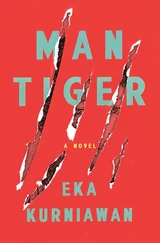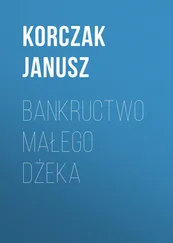“No newspapers have been published today, Comrade,” said Adinda. “And I’m willing to bet there won’t be any newspapers for at least a week. Maybe there won’t be any newspapers ever again.”
“We’ll go back to the Stone Age without newspapers!”
“I’ll make you some coffee, maybe that will help you return to your senses.”
Adinda went to the kitchen and made two cups of coffee, and when she returned, she saw Comrade Kliwon standing at the gate peering down the street. It looked as though he was still hoping the paperboy would appear on his bike. Adinda placed the cups of coffee on the table and sat back down in her chair.
“Come back to your seat,” she said to Comrade Kliwon, “if you’ve come back to your senses.”
“What makes no sense is a day without newspapers.”
“Forget the fucking newspapers, Comrade! Your Party is in crisis, and they need a clearheaded leader.”
Whatever the case, it was truly unbelievable that the Communist Party — by far the strongest faction in Halimunda — could be facing a coup d’état. At that time, the Party had the most gleaming reputation in the entire history of the city. Had there had been an election, the Communist Party would have won hands-down. The city was decorated all in red, and even the mayor and the military let them do whatever they wanted.
The Communists pressured the schools, even the kindergartens and the schools for the disabled, to teach the Internationale to their students. And of course they plastered pictures of Marx and Lenin on the classroom walls, all in one line with the portraits of national heroes. And on Independence Day — and please remember that in Halimunda that meant the 23rd of September — they held the most cheerful carnival and parade, with the communists shouting out their revolutionary cheers. The city folk would spill out in a crowd along the road and listen to verses from the “Sama Rata Sama Rasa” treatise that Marco Kartodikromo had written many years ago, proclaiming that everyone should be treated equally no matter their rank or occupation.
Adinda was thinking the mass demonstrations about to be carried out by the communists on the streets of Halimunda would be like that. Years later, she would realize that after the Communist Party was outlawed she never again saw such cavalcades, with all the decorated cars driving by on all the roadways. Usually Comrade Kliwon would be right smack in the middle, riding in a convertible wearing the cap that he had gotten from Comrade Salim, waving his hands at the young girls who screamed hysterically by the side of the road.
The opposing parties were amazed by his incredible popularity, and prayed that public elections wouldn’t be held anytime soon. Other parties claimed to be fellow revolutionaries and waited for the communists to drop their guard so they could stab them in the back. Still, none of this had been achieved effortlessly, but through two years of exhausting work. It was even said that Comrade Kliwon had been the victim of two mysterious attempted assassinations. One night he was knifed by an attacker who suddenly appeared and then just as suddenly vanished without a trace. Someone else tossed a hand grenade through his bedroom window. But he remained quite healthy, and said in a public rally that he forgave the attempted murderers, whoever they were. He said people like that simply didn’t understand the communist mission, which was to eradicate the abuse of man against man — this made his reputation, and the Party’s, rise even higher in the people’s esteem, until even little children praised them.
All of this frenzied political activity worried his mother Mina terribly. She still remembered her husband, executed by the Japanese, and saw all the propaganda and carnivals as ridiculous and pointless commotion. Mina sometimes watched her son giving a speech in front of a mass of thousands, shouting slogans, like “Crush the landlords!” that would be enthusiastically echoed by the crowd. And he cursed not only the landlords, but also money lenders, factory owners, boat captains, plantation officials, and the railway company. Of course, he also cursed America and the Netherlands and neocolonialism, all with such eloquence it was as if God himself was whispering the words into his ear
Every time Comrade Kliwon went home for a visit, Mina would tell him that it wasn’t good to make too many enemies. “One friend is way too few, but one enemy is way too many. You are making a lot of people hate you,” she said worriedly. Comrade Kliwon would reassure her that what had happened to his father was not going to happen to him, then he’d smile and drink the tea that she had made for him before going to lie down.
One day, at the urging of the Communist Party, a group of young kids was thrown into the military prison. They had been having a party at school and all they did wrong was take the stage and sing some rock and roll songs, but Shodancho complied with the communists. Hearing this, Mina’s worry turned into anger and she marched to the Party headquarters and blew up at her son. “I can’t let this happen!” she screamed in the middle his crowded office. “Didn’t you used to play those songs on your guitar in the old days, didn’t all of you?” she said to the people gathered around. “And now you are ordering those kids into military custody for singing them?”
But party discipline had made Comrade Kliwon inflexible and his attitude toward his mother was cold. He just placated the woman, walked her out to the side of the main road, and asked a becak rickshaw driver to take her home.
He didn’t stop there, but started putting pressure on the city council, the military, and the police to confiscate those brain-rotting Western pop records and throw whoever listened to them — even in the privacy of their homes — into jail. “Crush America and may its false culture be cursed!” he shouted every time. In exchange, the Party began to generously support folk art, providing the usual snacks and some Party propaganda too, so that all the folk art that had been subversive in feudal and colonial times now began to jazz up the Halimunda scene. For the Party’s anniversary they performed sintren , with a pretty girl who disappeared inside a chicken coop and reappeared holding a hammer and sickle, looking even more beautiful in full makeup (and the audience clapped). The kuda lumping trance dancers didn’t just eat glass and coconut shells, but now also swallowed the American flag. The forbidden rock and roll records were also smashed and swallowed.
After his success building up the Party so rapidly, the Party members in the capital fixed their sights on Comrade Kliwon. It was heard that he had been asked to join the Politburo and that he was a strong candidate for the Central Committee of the Indonesian Communist Party. His political career was dazzling, but Comrade Kliwon refused all honors with an attitude of incomprehensible defiance, even one crazy offer that would have made him a member of the Comintern. He was not working for his own luminous career, he said. He was working so that communism might blossom on Halimunda soil, and so he didn’t want to leave the city.
Men began to return, reporting on the demonstrations in the streets. The military was prepared on all sides — the city forces had taken to the streets and had gained, led by Shodancho, who was motivated by his personal hatred for Comrade Kliwon.
“DN Aidit has been captured,” someone reported.
“Nyoto has been executed,” another report came in.
“DN Aidit met with the president.”
All reports were convoluted and the only information that could be gleaned was from the radio, which couldn’t be trusted. All morning it had been reporting the same exact thing over and over again, as if the news had been prerecorded: The Communist Party attempted a coup d’état, which failed because the army acted quickly. The army has temporarily taken power in order to rescue the nation . Another report arrived: The president was under house arrest. Everything was completely confusing.
Читать дальше











